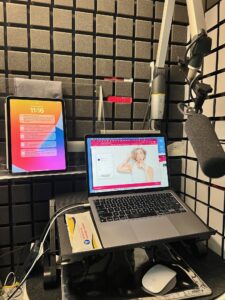
In the vast and varied realm of voice-over (VO) work, the domain of medical narration is unique. Not every voice actor wants to pursue it. Not every voice actor should pursue it.
Many sub-genres in VO require specific skills– for example, if you’re voicing animations, you can expect to make grunting, shouting, yelling, screaming, hitting, hurting, falling, and dying sounds that you’ll never do for a medical project. Those utterances sound simple enough, but they’re pretty taxing on the vocal chords and are left for the end of the session after all the other lines have been recorded. The animation actors pour every last ounce of themselves onto the studio floor and then go home to nurse their voices back to health.
The skills needed for medical narration are pretty different. The narrations aren’t vocally taxing, though some scripts, like Important Safety Information (ISI) content, can be long, requiring stamina and endurance to maintain a consistent level of energy and engagement throughout. If you’re familiar with recording eLearning projects or audiobooks, you understand this.
The Complexity of Medical Scripts for Voiceover
What makes the medical genre genuinely challenging is the content. Medical scripts are a gateway to understanding complex conditions, treatments, and procedures. These scripts often contain unfamiliar terms, pharmaceutical names, anatomical references, and procedural details. Sometimes, the words are long and difficult to pronounce, like the longest word in the English dictionary, Pneumonoultramicroscopicsilicovolcanoconiosis (a fancy way to say Black Lung Disease or Miner’s Asthma).
People like me love the challenge of multi-syllabic, unusual words that take much practice before rolling off the tongue. Other people dread the thought and fear the anxiety of having to perform such a task– whether on their own or, more likely, in a session with the producer, medical writer, agency creatives, and even the pharmaceutical client, who can be there as well.
Do I Even Understand What I’m Saying?
Tough words aside, you can get those sounding smooth as silk with enough practice. The trickier part is understanding all the other words in the script! As much as science writers, medical illustrators, and medical animators do an excellent job of taking complex ideas and communicating them “simply,” sometimes the science itself is still complicated, or the sentences are long and need parsing to clarify what information is modifying another piece of information, and which, for example, is the more important of the two.
To do that, you need to understand what you’re saying. For example, a common phrase in biochemical scripts refers to a “downward signaling cascade.” Is that a good thing or a bad thing? It depends on the context! So, you need to understand what’s happening to know whether that cascade generates a positive or negative effect.
By deconstructing a script with complicated terminology, dense sentences, strings of pharmaceutical names, lists of data and statistics, and technical details to understand its parts, you can reconstruct it to tell the story as if you are the Subject Matter Expert (SME).
I voice medical device animation videos, scientific and educational videos, pharmaceutical mechanism of action videos (MOAs), patient-centered communications, mechanism of disease videos (MODs), and more. I also coach other voice-over talents in medical narration.
Voice Actors Bridge the Gap: Language and Clarity 
Translating medical terminology into an understandable and relatable narrative requires finesse. We are not tasked with writing the script, but we must deliver it in a way that makes it understandable to the listener. It’s about striking a balance between technical accuracy and audience comprehension. Voice actors in medical narration are tasked with conveying a variety of information in various ways depending on who the audience is. Healthcare professionals? Patients? Caregivers? Each demographic wants to be spoken to in a certain way, and it’s the voice actor’s job to connect with those diverse audiences accordingly.
Empathy Matters, Especially in Healthcare-Related Narrations
Beyond technical precision, scripts directed to patients, loved ones, or caregivers often discuss difficult situations, compromising diseases, risks affiliated with medications, or changes in living environments. We need to infuse empathy into our medical narrations. While some of these patient experiences may be serious, we cannot let the gravity of the content seep into our voices. We cannot join the patient in feeling concerned about their illness. While we express compassion, we must also convey a confident and hopeful tone that with the right medical guidance– “talk to your doctor,” -they will be okay. Whether speaking about treatments, patient experiences, or medical breakthroughs, the voice actor becomes the bridge between the story and the audience, never being the focus of the story ourselves but just the storyteller.
 Research and Preparation in Scientific Scripts
Research and Preparation in Scientific Scripts
A little research goes a long way to achieve an excellent medical voiceover read. I recommend voice actors consult with their clients and ask them to explain in lay terms what the project is about. What is new in this story? What is vital in this science? What discovery is changing the way we understand a disease or how to treat it? This information helps us comprehend the subject matter and grasp the script’s nuances and context, creating a more authentic, believable delivery.
Precision in Pronunciation
Pronunciation in medical scripts is non-negotiable. Mispronouncing medical terms disrupts the flow, takes the listener out of the story, and can lead to misinterpretation. Voice actors must go the extra mile to pronounce every medical term accurately, reinforcing their commitment to professionalism and accuracy. Some terms have different pronunciations. Ask your client how they want them voiced. Check pronunciations with Webster’s Medical Dictionary by calling the company to ask how their name or product name is pronounced, and search YouTube for credible sources on pronunciations. I’ll check a few to triangulate to the truth. If someone speaks English with a foreign accent, their pronunciation of a drug, illness, or disease may not be how most native English speakers would say it.
Is Medical Narration Right for You?
In the voiceover realm, medical narration is a unique and challenging domain. It requires a blend of linguistic skills, empathy, in-depth research, and a commitment to precision. Understanding the nuances of medical script interpretation isn’t just about delivering words; it’s about articulating a story that educates, empathizes, and connects with the audience on a profound level. Mastering this art elevates the impact of medical voiceovers, making them a powerful tool for disseminating crucial information and shaping perceptions.
For those aspiring to venture into medical voiceover, embracing the complexities while balancing technical accuracy with emotive delivery will pave the way to becoming a voice that educates, comforts, and inspires change in healthcare communications. As a medical narration coach, I help my medical students find these qualities in themselves and their voice-over narrations.